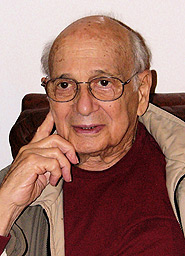Berkeleyan
Obituary
Melvin Webber
![]()
| 07 December 2006
 |
Melvin M. Webber, a professor emeritus of city and regional planning and an international authority on city planning and transportation who helped plan Bay Area Rapid Transit (BART) in the 1950s, died of multiple myeloma at his Berkeley home on Nov. 25. He was 86.
During more than half a century as a planner and educator in the Bay Area, Webber headed Berkeley's Institute of Urban and Regional Development (IURD) and the University of California Transportation Center. He also successfully fought for establishment of a Ph.D. program in planning at Berkeley.
"He was an icon in transportation and planning. He was huge in his field," says Elizabeth Deakin, a planning professor who succeeded Webber as director of the UC Transportation Center after his retirement.
Born in Hartford, Conn., in 1920, Webber earned a B.A. in economics (1947) and an M.A. in sociology (1948) from the University of Texas. He came to Berkeley as a student in 1949, earned an M.C.P. in economics and planning in 1952, and then became an assistant research city planner on campus. He joined the faculty of the Department of City and Regional Planning in 1959.
In 1970, Webber became director of IURD, where he initiated the first large-scale, systematic study of the BART district's impact on travel behavior and land use. The study was new in its policy focus and methodology, generating methods still employed today.
Webber's conclusions - that "BART had been an honest mistake," that it had fallen far short of expectations in ridership, that its costs were excessive, that its route pattern was too rigid, and that its land-use impacts were minimal - have contributed to major debates and decisions about subsequent funding of heavy-rail systems at the state and federal levels. Instead, he argued for a more cost-effective and flexible mix of transportation modes, including automobiles and express buses, as well as pricing strategies to reduce infrastructure investment.
Daniel McFadden, a Berkeley economics professor who won the Nobel Prize in economics in 2000 for his work on how consumers make decisions, said Webber was the key person on campus who in 1971 recognized the merit of McFadden's research on choice behavior and his proposal to use BART to test methods for predicting demand for new transportation methods.
"The research that came out of my project launched empirical analysis of choice behavior as an accepted tool for understanding and predicting behavior, and led to the recognition by the Nobel committee of my original, obscure paper on this subject," McFadden said. "I would say that he was my mentor, and one of the people on whose shoulders I stood to receive the recognition that I have."
Webber served as editor of the Journal of the American Institute of Planners, a publication in which he "elevated rigorous scholarship in conjunction with professional and policy relevance," said Michael Teitz, Webber's colleague and an emeritus professor of city and regional planning. Webber also founded the journal Access, which seeks to make complex analyses of policy issues comprehensible, and was its editor until his death.
The city as switchboard
Webber's contributions to urban-planning theory centered on two sets of ideas that he developed beginning in the early 1960s. Reflecting on the complexity of urban development in an age of rapidly growing communications and mobility, he challenged the conceptual foundations of the field, postulating that urban planners and transportation analysts should focus less on the notion of "place" and more on the physical and informational linkages and connections that bind together what he called "non-place realms."
Seeing the city as something of a giant switchboard, Webber anticipated by decades the currently fashionable views of the network society. In light of new forms of communication and the prevalence of the automobile, he argued that concentrated, denser urban forms were not necessarily more desirable than more dispersed settlements - ideas that resonate today in debates over urban sprawl.
Webber's second major theoretical insight, developed with the German-born professor Horst Rittel, who spent many years at Berkeley, defined a new class of "wicked problems" in public policy, which by their nature defied solution by conventional, rational approaches. Some classic examples of wicked problems include economic, environmental, and political issues.
In nominating Webber in 1990 for the Berkeley Citation, a prestigious award given to members of the campus community for the impact of their work, colleagues described him as the "father of modern academic urban planning" and a visionary whose research and teaching wielded "national and international influence."
In 2000, Webber won the Distinguished Planning Educator award from the Association of Collegiate Schools of Planning, the highest annual prize in United States planning education.
"Mel Webber taught his students to be skeptics," said former colleague Martin Wachs, director of transportation, space, and technology at the RAND Corporation and a Berkeley emeritus professor. "If an idea was crystal-clear and simple, he suspected it was wrong and asked question after question to peel back the layers of complexity that lay behind most matters of public policy in the city."
In addition to continuing his scholarship in retirement, Webber continued his service to the university. He chaired the Academic Senate Committee on University-Emeriti Relations, served on the board of the Emeriti Association, and was one of the founding board members of the UC Berkeley Retirement Center. In this capacity he helped to lay the groundwork for the center and bring it to fruition in 1997. In 2000, Webber and another board member initiated a Learning in Retirement program for Berkeley emeriti and staff retirees that has grown to serve 1,000 students.
Before his death, Webber asked that no formal memorial services be held for him. He is survived by his wife, Carolyn Cott Webber of Berkeley; son Thomas Webber of Pacifica; daughters Jane Webber and Martha Muraro, both of Berkeley; and four grandchildren.

